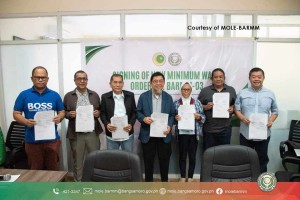
COTABATO CITY (PIA) -- Private sector employees in the Bangsamoro Autonomous Region in Muslim Mindanao (BARMM) have expressed their satisfaction with the wage board for approving their pay hike.
Signing the new “Wage Order No. BARMM-03” on Feb. 7, the Bangsamoro Tripartite Wages and Productivity Board (BTWPB) directed private sector employers to pay their workers a P20 daily wage hike based on the order approved by the board.
“Lahat tayo mas gusto natin na mas malaki pa sa P20.00 ang increase. Kaya lang, the problem is hindi kakayanin ng employer,” Jonathan Acosta, systems operator of Cotabato Light and Power Company, said.
[We all prefer the increase to be greater than P20.00. But the problem is that employers don’t have the capability to pay.]
The new wage order applies to non-agricultural workers employed in industry, manufacturing, construction, commerce, mining, and the academe. The agricultural sector, however, includes non-plantation and retail workers.
“Mas mabuti pa iyong P20, at least may trabaho lahat kaysa may mawalan ng trabaho. Iyon po iyong side namin sa labor,” Acosta rationalized.
[P20 is so much better. At least everyone has a job, rather than losing a job. So that's our side from the labor sector.]

Under the wage order, a new basic pay rate will be P336 from P316 for the non-agriculture sector and P326 from P306 for the agriculture sector in all provinces of Maguindanao del Sur, Maguindanao del Norte, Lanao del Sur, Basilan, Sulu, Tawi-Tawi, and the cities of Lamitan and Marawi.
On the other hand, workers in Cotabato City will receive a new daily minimum wage rate ranging from P341 to P361 for the non-agriculture sector and from P316 to P336 for the agriculture sector.
The Special Geographic Area (SGA) retains its status quo of P341 for non-agriculture and P316 for agriculture minimum pay.
According to Ministry of Labor and Employment (MOLE) Minister Muslimin Sema, chairperson of the Bangsamoro Wage Board, the new wage hike is the third for the BARMM since its creation in January 2019.
He further said that despite the challenges faced by business sectors, the government and employers agreed and ventured about the increase in wages in order to address workers' concerns and support their needs.
“It took time for us to decide because while we see so much about the well-being of our workers, we are also equally worried about the status of employers who are suffering from the effects of rising oil and electricity prices,” he pointed out.
Sema said that the new pay hike would apply to all minimum wage earners in the private sector within BARMM, regardless of their designation, position, or status, and irrespective of the methods by which their wages are paid.

Meanwhile, lawyer Anwar Malang, the Bangsamoro wage board management representative, shared his views on the increase.
“Our employers have no problem with the wage increase. P20 is enough, considering the current price hike of necessities for both workers and employers,” he said.
The latest wage order does not cover households or domestic helpers under Republic Act 1061, the Batas Kasambahay, or workers registered as barangay microbusiness enterprises.
MOLE also explained that before the approval of the new wage order, the board initiated deliberations on wage review and conducted public consultations to gather public sentiments, views, and opinions from both the labor and management sectors.
The new wage order shall take effect fifteen days from its publication in at least one newspaper of general circulation in BARMM. (LTB - PIA Cotabato City)



